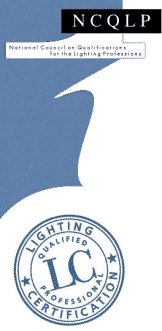
The National Council on Qualifications for the Lighting Professions
is an independent, non-profit certifying board. Founded in 1991, its
mission is to protect the well-being of the public through effective and
efficient lighting practice. Through a peer-review process, the NCQLP
establishes the education, experience and examination requirements for
Lighting Certification.
Industry Wide Member Organizations
American Society of Interior Designers (ASID)
California Energy Commission (CEC)
Electric Power Research Institute (EPRI)
Illuminating Engineering Society of North America (IESNA)
International Association of Lighting Designers (IALD)
International Facility Management Association (IFMA)
International Interior Design Association (IIDA)
Lighting Research Center (LRC)
National Association of Independent Lighting Distributors (NAILD)
National Electrical Manufacturers Association (NEMA)
National Lighting Bureau (NLB)
New York State Energy Research & Development Authority (NYSERDA)
Northeast Energy Efficiency Partnership, Inc. (NEEP)
Nuckolls Fund for Lighting Education
U.S. Department of Energy - Federal Energy Mgt. Program (FEMP)
U.S. Environmental Protection Agency (EPA)
U.S. General Services Administration (GSA)
The Lighting Certified (LC) credential is a voluntary, industry-led effort that does not replace legally required professional certifications or licenses, but is a multi-disciplinary qualification distinguishing practitioners in the specialized field of illumination. The LC credential is open to individuals who practice within the field of lighting and have met the minimum requirements for education, experience and knowledge.
Legally Defensible National Exam and Certification
The LC credential is current, credible, and accessible. Current lighting practices are represented in each administration of the exam, and LC professionals are required to recertify every three years to insure their knowledge of lighting application and technology is current. The NCQLP also recognizes credentialing standards by constructing an examination that reflects the knowledge and skills required for competent practice. The examination is based on published knowledge, and is administered by an independent and industry wide board and testing agency. The LC credential is accessible to all potential candidates across the industry (e.g., designers, engineers, contractors, distributors, manufacturer representatives) with the eligibility requirements of a bachelor's degree in a related field and 3 years experience, or six years of lighting experience.
"EPA recommends that lighting professionals pursue a certification program such as that offered by the National Council on Qualifications for the Lighting Professions (NCQLP). We are encouraging ENERGY STAR Building Partners to look for the NCQLP when selecting a lighting professional."
-Jean Lupinacci, Chief, ENERGY STAR Building Program, U.S. Environmental Protection Agency
National Council of Qualification
for the Lighting Professions
526 King St., #405
Alexandria, VA 22314
703-518-4370
703-706-9583 (fax)
e-mail: info@ncqlp.org